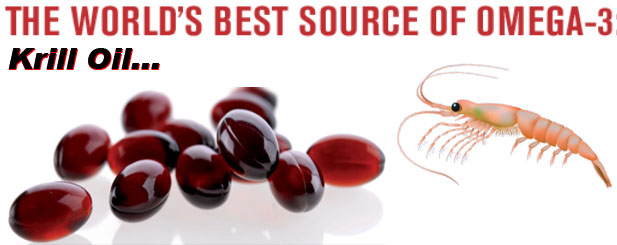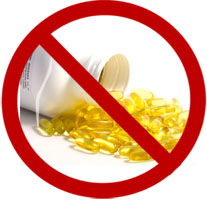What The Heck Is Astaxanthin And How Does It Accelerate Fat Loss?
Guest Post By: Cassandra Forsythe-Pribanic, PhD, RD, CSCS
Have you ever wondered why krill oil was brightly colored red instead of yellow like other marine omega-3 lipids? Well, this red shade is not only pretty to look at, but it can help you burn more fat and increase your athletic endurance – added benefits we’re all looking for.
This pigment responsible for giving krill oil its unique color is a special red carotenoid called astaxanthin. If that isn’t just a mouthful enough to say, it has also has been demonstrated to have a laundry list of pharmacological effects including as an antioxidant, anti-cancer, anti-diabetic, and anti-inflammatory agent. But, what we’re going to focus on here is fat loss and endurance.
Sources of Astaxanthin…
Astaxanthin is a colorful antioxidant that occurs naturally in a few different foods – mainly of marine sources. It’s the primary reason some fish and seafood are colored red; the pink flesh of salmon is a perfect example. However, you have to be careful. Many farmed fish are given a synthetic version of astaxanthin in their diet, or their flesh is dyed with it before being sold in the market because astaxanthin is lacking in farmed fish feed. In the wild, salmon and other fish get astaxanthin naturally from the microalgae they eat. In fact, microalgae is the greatest naturally-occurring source of astaxanthin; shrimp, krill, and salmon are red from eating it.
Another place to get astaxanthin in human diets is from bright yellow egg yolks, but again, this usually comes from a synthetic form of astaxanthin fed to chickens. Organic chickens are fed natural compounds containing astaxanthin, so that’s your best bet. Most red, yellow, and orange fruits and vegetables are colored due to other natural carotenoids, like beta-carotene. The best way for humans to get astaxanthin naturally is to eat a diet of wild salmon, trout, seafood, and organic chicken eggs, and take supplements rich in astaxanthin, like krill oil.

|
Krill oil is made from a species of krill called Euphausia superba, a tiny shrimp-like crustaceans that are approximately 1 to 6 centimeters long. Three of the most important nutrients in krill oil are: (1) omega-3 fatty acids similar to those of fish oil, (2) omega-3 fatty acids attached (conjugated) to phospholipids, mainly phosphatidylcholine (alternatively referred to as marine lecithin) and (3) astaxanthin, an antioxidant.
Krill oil comes from the Antarctic, or colder areas of our ocean, but it is now harvested for feed for fish farms. Commercial fishing of krill occurs primarily in the Southern Ocean and the northern Pacific Ocean along the coasts of Canada and Japan. A small percentage is harvested for human consumption. Whales eat them by the ton, and they also make up a part of the diet of humans, mainly the Japanese and Russians. Click Here for more info & to order Krill Oil Supplements online. |
Fat Loss, Endurance and You…
A group of Japanese researchers recently demonstrated that mice given astaxanthin in several different doses, along with a high-fat diet, had significantly lower body weight and body fat levels compared to mice fed a high-fat diet of the same calorie level. Astaxanthin also reduced liver weight, liver triglyceride content, and blood cholesterol and triglyceride levels. What this means is that when added to a high-fat, high-calorie diet, astaxanthin prevented mice from becoming overweight with a fatty liver and high blood fat levels. The way astaxanthin did this was not by reducing the digestion of absorption of dietary fat, but instead by increasing the usage of fat as an energy source. This was supported by a decrease in the respiratory exchange ratio (RER), which indicates that fat was used for fuel, instead of carbohydrates.
In another Japanese study, mice were given astaxanthin along with a daily exercise routine (and if you’ve never seen mice run on a treadmill, you’re really missing out). They were divided into four groups: sedentary, sedentary plus with astaxanthin, running exercise, and exercise plus astaxanthin. After four weeks the animals in the exercise groups were placed on a treadmill to test a range of physical parameters. Similar to the study above, astaxanthin increased fat usage during exercise and accelerated the normal decrease in body fat that occurs with regular exercise. It did this by increasing the movement of fats into the mitochondria for energy production via enhanced carnitine palmitoyltransferase I (CPT I) activity (a transport protein for fat located on the cell membrane). What this means is that astaxanthin supplementation spared muscle glycogen (a normal fuel source for exercise) and used fat stores instead.
Finally, mice given astaxanthin in doses of either 1.2, 6, or 30 mg/kg body weight for 5 weeks, along with regular swimming exercise, were shown to have a significant increase in exercise time to exhaustion (meaning they swam longer) than mice given a placebo. Blood lactate levels (a marker of exercise fatigue) were lower in the animals given astaxanthin, while blood non-esterified fatty acid and glucose levels were higher (indicating that astaxanthin spared blood energy sources). Overall, astaxanthin improved swimming endurance when given for only a short period of time.
What Dose is Needed for Humans?
Many people criticize animal research as being irrelevant to humans, but that’s not entirely correct. True, we’re a different species, but our enzymes, muscle function, and metabolisms are scarily similar. Plus, there are only so many humans you can poke holes in before someone starts to get suspicious. But I digress…
The doses used in these animal studies can be converted to human doses. All of the studies above used the same astaxanthin doses. At the lowest level of 1.2 mg/kg for mice, this translates to a dose of 0.1 grams (100 mg) for humans. At the minimum, humans can still take a dose of 0.012 grams (12 mg) of astaxanthin from all dietary sources and see results over no astaxanthin at all, because research with humans have shown this dose to be effective for reducing blood triglyceride levels, and increasing healthy blood HDL cholesterol levels. Further, doses have been suggested to accumulate over time, since it is fat soluble, so lower doses would act as higher doses with longer durations of supplementation.
Astounding Astaxanthin…
Overall, based on current research, astaxanthin holds promise as a fat-burning, exercise-enhancing, health-improving dietary nutrient. Further research will confirm this. We’ve also covered the EASIEST AND SIMPLEST way to not miss out by using a quality Krill Oil chocked full of astaxanthin like EFA Icon. This, in addition to eating a diet rich in red-colored seafood like salmon and shrimp, may increase the tools to keep your body lean, fit, and free of disease. And, in this age of chronic diseases and foods full of high-calorie anti-nutrients, we need all the tools we can get.

|
Get The Shocking Truth About The FISH OIL You Are Taking Now! WARNING: Do NOT Take Any Fish Oil Until You Read This… Click Here For More Info… |
Resources:
Ikeuchi M, Koyama T, Takahashi J, Yazawa K. Effects of astaxanthin in obese mice fed a high-fat diet. Biosci Biotechnol Biochem. 2007 Apr;71(4):893-9. Epub 2007 Apr 7.
Aoi W, Naito Y, Takanami Y, Ishii T, Kawai Y, Akagiri S, Kato Y, Osawa T, Yoshikawa T. Astaxanthin improves muscle lipid metabolism in exercise via inhibitory effect of oxidative CPT I modification. Biochem Biophys Res Commun. 2008 Feb 22;366(4):892-7. Epub 2007 Dec 17.
Ikeuchi M, Koyama T, Takahashi J, Yazawa K. Effects of astaxanthin supplementation on exercise-induced fatigue in mice. Biol Pharm Bull. 2006 Oct;29(10):2106-10.
Yoshida H, Yanai H, Ito K, Tomono Y, Koikeda T, Tsukahara H, Tada N. Administration of natural astaxanthin increases serum HDL-cholesterol and adiponectin in subjects with mild hyperlipidemia. Atherosclerosis. 2010 Apr;209(2):520-3. Epub 2009 Oct 14.
Fassett RG, Coombes JS. Astaxanthin, oxidative stress, inflammation and cardiovascular disease. Future Cardiol. 2009 Jul;5(4):333-42.







13 Comments
Ross
I’ve been supplementing with astaxanthin for a month or so now, still unsure about the results though…
Mike
I supplemented with fish oil for 3-4 years. I’ve got a knee problem, had a cartlidge removed when I younger. Now I saw almost instant results with fish oil. Within a few weeks the pain had decreased considerably and it didn’t flare up like it used to. About 6 months ago, after reading similar to what has been shared here, I changed to a quality krill oil supplement. Unfortunately almost immediately my knee flared up, I was in a lot of pain daily. At first I thought I had somehow agitated my knee myself and that was the cause. But it just wouldn’t settle down. Eventually I changed back to fish oil 2 months ago, and again within a week or so the knee became much better.
Pawan singh
Hi Lee, do you want to recommend any fish oil suppliments which will be healthy and with no side effects.
John
Hi Lee, I do not use any fish oil suppliments, I rather consume it naturally.
leehayward
======================
That’s interesting Mike, were you using the same does of Krill Oil as you were with the fish oil?
Another great product that I’ve been using with good results is “Omega Blue” fish oil from http://www.BlueStarMuscle.com this is a very high quality / high potency fish oil supplement that contains a whopping 60% omega 3’s (most generic brands contain only about 20% or less).
leehayward
===========================
If you want to use Krill Oil supplements then I would recommend EFA Icon from
http://leehayward.getprograde.com/essential-fatty-acid.html
And if you wanted to use a high quality fish oil supplement instead, I’d recommend Omega Blue from http://www.BlueStarMuscle.com
Pawan Singh
Hi Lee, thanks for responding and your recommendation. I got no such problems. but for getting proper nutritions and endurance in the body, which one will be more beneficial. I am not a pro. bodybuilder. but i do exercise almost daily which includes weight as wells cardio.
Shawn
Hi Lee, how is flaxseed oil? can it act as a substitute for fish oil, or krill oil?
leehayward
==============
Fish oil (or krill oil) is one of those supplements that I consider a “must have”. Even if you don’t workout with weights you should still supplement your diet with high quality fish oil supplements to get the omega 3’s that you need for optimal health.
leehayward
==============
Flaxseed oil is a good source of omega 3’s as well, but it’s doesn’t have as many health benefits as fish oil. If you were just going to use 1 supplement for getting essential fatty acids in your diet I’d recommend the Krill Oil from:
http://leehayward.getprograde.com/essential-fatty-acid.html
Shawn
Arite cool. I asked since im a vegetarian, so I guess the flaxseed will have to do.
Thanks for the response!
mike
I guess better late than never, but this info has been out for the past at least the past 2 years when I switched over and started krill and Astaxanthin supplimenting . The problem with fish oil is huge. the bad taste it leaves should of been your first clue. Like all suppliments quality control is the issue, and the ‘other ingredients’ should also be noted. My rule is “if you can’t pronounce don’t eat it.
Tyler
Flax doesn’t have the EPA and DHA which are the omega 3’s that have been shown to be healthy. The body can only convert a minute percentage of alpha linolenic omega 3 (the kind in flax) to EPA and even less to DHA via the elongase enzymes.